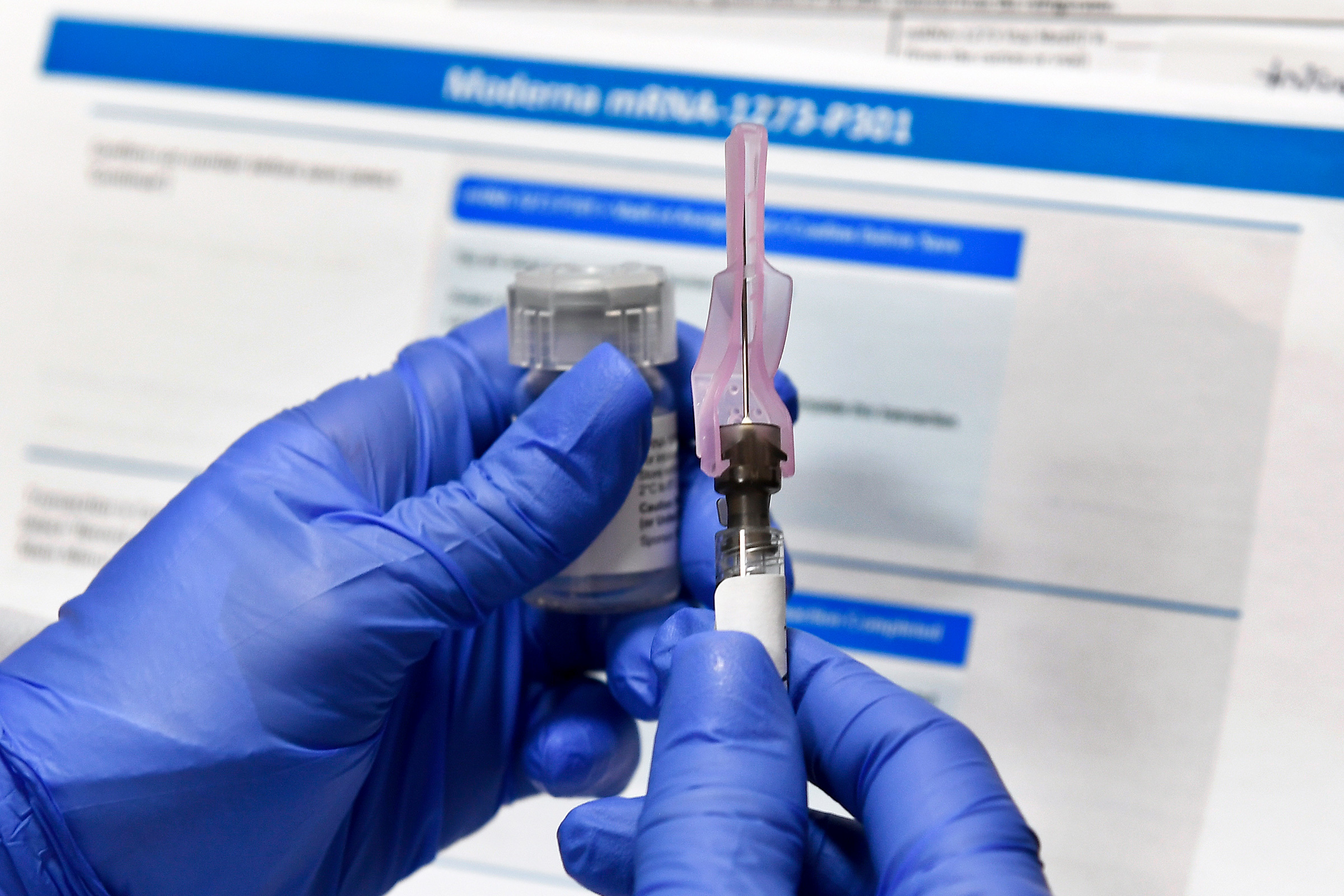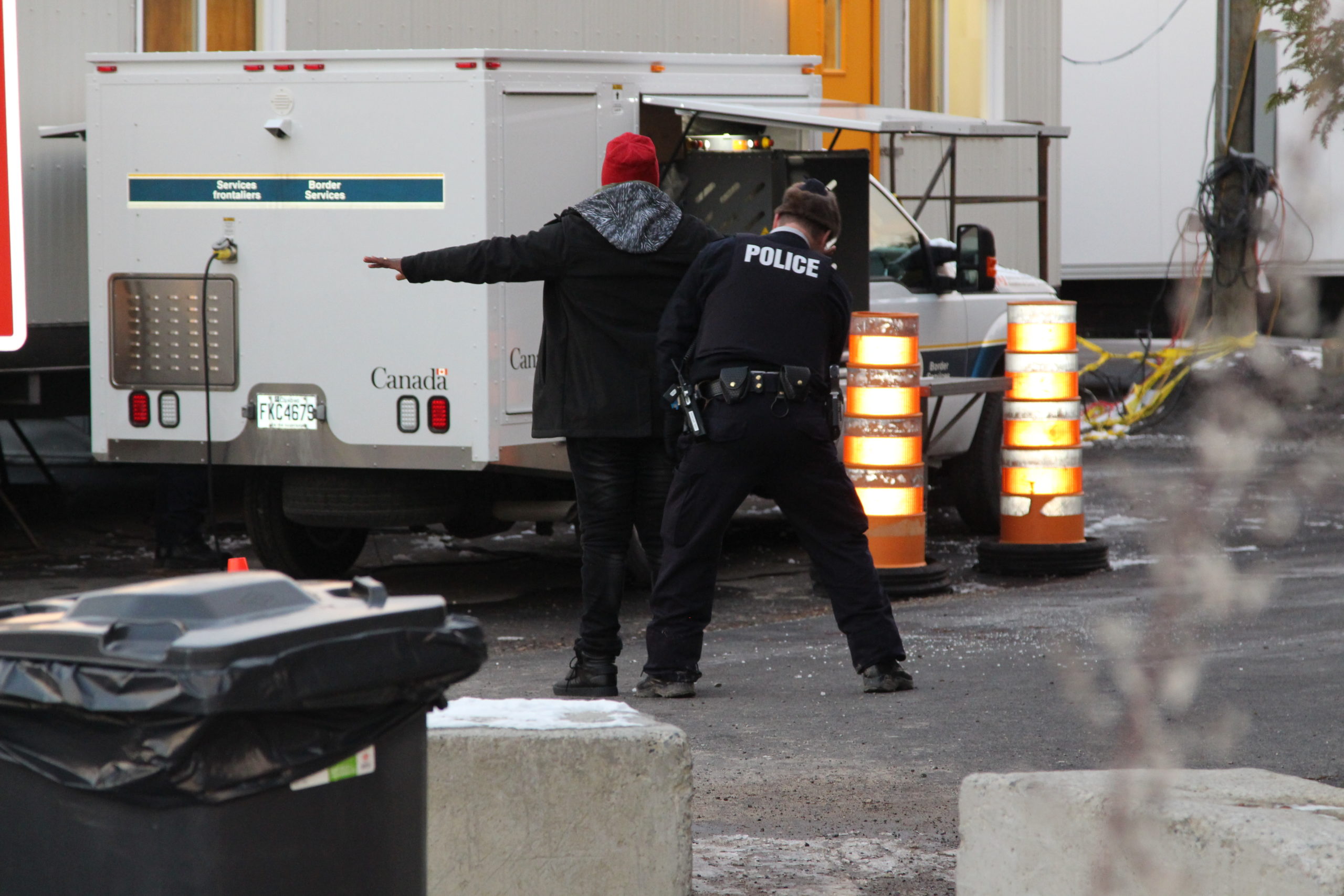Episode 214: Who Will Get The COVID Vaccine?; Canadian Court Ruling Says U.S. No Longer Safe For Refugees
A Canadian court has determined the U.S. is no longer safe for refugees. This week on NEXT, we go to the border of Vermont and Canada to learn what this could mean for asylum seekers heading north. Plus, when a COVID-19 vaccine is approved, who will want one and who will get priority? New Hampshire residents who commuted to Massachusetts before the pandemic are not keen on the state’s persisting income taxes as they work from home.
When It’s Ready, Who Gets The COVID-19 Vaccine First?

In this Monday, July 27, 2020 file photo, a nurse prepares a shot as a study of a possible COVID-19 vaccine, developed by the National Institutes of Health and Moderna Inc., gets underway. (AP Photo/Hans Pennink)
The New York Times reports there are at least 35 coronavirus vaccines in development that are being tested on humans in clinical trials. Nine are in the more advanced Phase 3, which means they’re being tested on tens of thousands of people for safety and effectiveness. The federal government has been funding mass production of a number of potential vaccines, including one being developed by the Cambridge, Massachusetts, biotech company Moderna — the winner of a $438 million federal grant this spring.
Brigham and Women’s Hospital in Boston is currently enrolling people in the Phase 3 trial of Moderna’s coronavirus vaccine. As GBH’s Craig LeMoult reports, one challenge the hospital faces is making sure people enrolled in the trial are as diverse as the population that could one day receive the vaccine.
Once COVID vaccines make it through development and are available through mass production, it will be up to the federal government to decide who gets priority.
“It’s just not a slam dunk that the old people would get a high priority right behind healthcare workers and the essential workers,” said 79-year-old Vermonter Roger Stone.
Vermont Public Radio’s people-powered journalism project, Brave Little State, tried to figure out who would be considered first. Investigative reporter Emily Corwin found the U.S. Centers for Disease Control and Prevention is working on determining that right now.
How Canadian Court Ruling Could Impact Migration Patterns In Northern New England

A refugee from the Democratic Republic of Congo is frisked after entering Canada illegally in upstate New York close to the Vermont border in 2017. (Lorne Matalon)
In July, Canada’s Federal Court ruled the United States is no longer a safe place for refugees. The court condemned the treatment of asylum seekers at U.S. detention centers and said the Safe Third Country Agreement between the two countries is now unconstitutional.
The agreement in question says both Canada and the United States are safe for refugees. That means when someone seeks asylum in either country, they have to stay there — the first safe country they’ve arrived in. If they try to cross from one country to the other, they’re immediately sent back. But the Canadian Federal Court ruling would change that. The court states that returning refugees to the U.S. is a violation of Canada’s human rights charter and says refugees should, instead, be allowed to pass over the border, possibly impacting migration routes in northern New England.
“A very close ally of ours — another country that’s been known for its human rights protections — is recognizing that this country, the United States, is no longer a safe place for people,” says Erin Jacobsen, a professor and director of the immigration clinic at Vermont Law School. “That we’re not honoring our international and domestic obligations to protect refugees.”
Independent producer Lorne Matalon reported this story for NEXT and asked both the U.S. Department of Justice and Department of Homeland Security to comment on the Canadian court’s ruling. The DOJ declined comment; DHS did not respond.
The Government of Canada is appealing the Federal Court ruling. The Safe Third Country Agreement remains in effect until that appeal is settled.
New N.H. Telecommuters Take Aim at Old Foe: Massachusetts Taxes
Before the pandemic, tens of thousands of New Hampshire residents commuted south to Massachusetts to work every day. That meant they had to pay Massachusetts income tax. COVID-19 is, of course, now keeping many workers in their homes. But that hasn’t stopped Massachusetts tax collectors from telling New Hampshire-based workers that they still owe that tax.
“Beforehand, when I was commuting into the city, taking advantage of public transportation, benefiting from what I saw as sort of an investment in just being able to get to and from work,” says former commuter Mark LaVoie. “But now that that dynamic doesn’t really exist any more, that I’m solely in New Hampshire, and haven’t set foot in Massachusetts for business since before COVID, I don’t see that benefit at all.”
New Hampshire Public Radio’s Todd Bookman reports on New Hampshire’s efforts to push back.
Also On This Week’s Show:
- N.H.’s Private Schools See Uptick In Interest During Pandemic (NHPR)
- Another COVID-19 Medical Mystery: Patients, Post-Ventilator, Who Don’t Wake Up (WBUR)
- Change, Or Checking The Box? Mass. Companies Are On A Diversity Exec Hiring Spree (WBUR)
- Shortbread Made with Homegrown Raspberries A Simple Treat (CAI)
About NEXT
NEXT is produced at Connecticut Public Radio
Host/Producer: Morgan Springer
Executive Editor: Vanessa de la Torre
Senior Director: Catie Talarski
Contributors to this episode: Lorne Matalon, Martha Bebinger, Craig LeMoult, Emily Corwin, Sarah Gibson, Zeninjor Enwemeka, Todd Bookman and Elspeth Hay.
Music from New England musicians: Todd Merrell, “New England” and “Zero Gravity” by Goodnight Blue Moon, “Brain Disease” by Anjimile, “Illudere” by The Latin Heartbeat Orchestra and “Get By” and “By The Phone” by West End Blend.
New to NEXT? You can find every episode or one you missed within our archives.
We want your feedback! Send critiques, suggestions, questions and ideas to next@ctpublic.org. Help us spread the word! If you like what you hear, rate and review us on iTunes.
